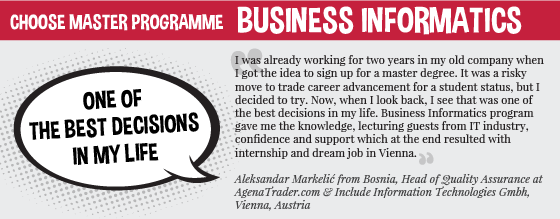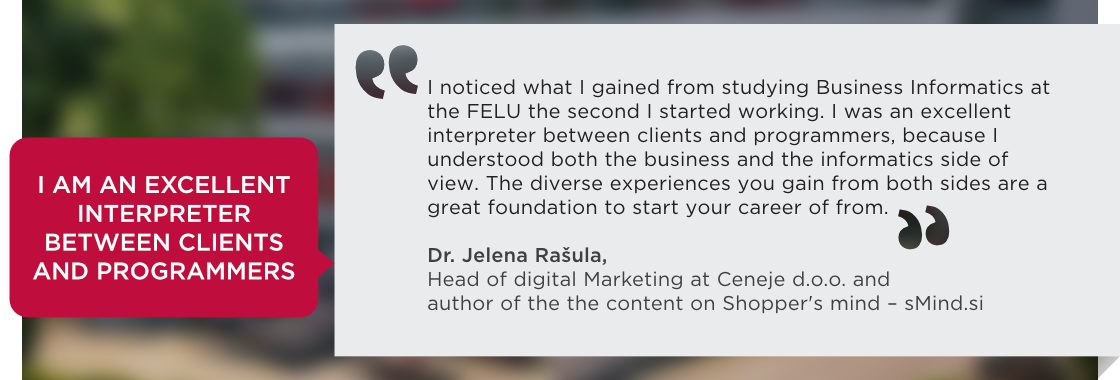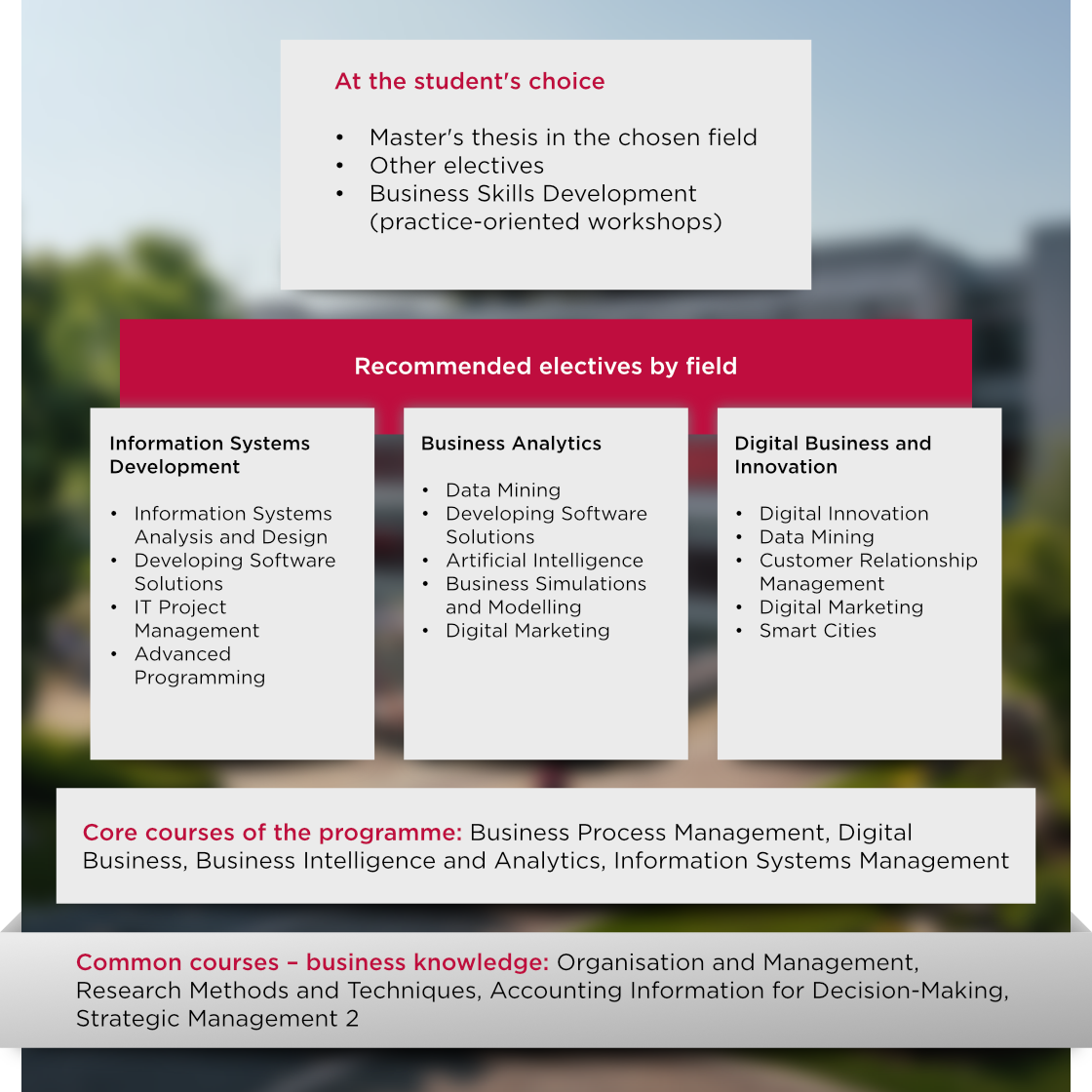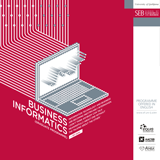Business Informatics

Why choose the Business Informatics programme?
The Business Informatics programme is intended for all those who are interested in the use of information technology in companies and other organisations and are aware that this, in addition to knowledge of technology, also requires business knowledge. The emphasis is on digitalisation, business analytics, and the improvement of business processes and business models through the development of information systems. Graduates of various faculties enrol in the master's study of business informatics. Just under a third of the students are graduates of the School of Economics and Business, and a third are graduates of other programmes, especially computer science, electrical engineering, mathematics, mechanical engineering, and social informatics. About a third of the students come from abroad, therefore all our students participate in international groups during their studies. They can also gain international experience by enrolling in one of the double degree programmes or by deciding to study at one of the 200 partner universities from around the world for a semester or two. Our students are in great demand in the labour market and benefit from good employment opportunities in Slovenia and abroad. Most of them already do student work in their professional field during their studies or are already employed when defending their master's thesis.
| Duration of study | 2 years (4 semesters) |
| Scope of ECTS | 120 ECTS |
| Study status | full-time & part-time |
| Degree | Master of Science (M.Sc.) – second cycle graduate in Business Informatics |

What knowledge will you gain?
In the Business Informatics programme, students acquire knowledge in the field of digital transformation, business processes, business data analytics, business software solutions, digital business and innovation, information systems management, developing and introducing information systems and IT projects, as well as broader business knowledge. During the last improvement of the programme, we especially strengthened the field of business analytics and the field of digital business and innovation, as there is a great demand in the market for people with such knowledge.
What is the method of study?

In most courses, the emphasis is on project work, which means that students apply the knowledge acquired during their studies in selected companies. One of the important features of our programme is also practical work with modern business solutions along with analytical and development tools and platforms. Students expand upon their knowledge in business skills development workshops in which external partners also participate.
Students are encouraged to connect master's theses with solving real business problems. The programme is implemented as full-time and part-time study. Part-time students are especially encouraged to find topics for project and master's theses in the companies in which they are employed, as this makes it easier to coordinate work and study.
Some special features of the programme
The Business Informatics programme can also be part of a double degree programme. For students who want to spend part of their master's studies at a foreign university, there is a possibility to participate in a double degree master's programme at one of the partner universities:
The double degree programme includes spending one year in the MSc programme of the partner university and leads to obtaining a double master's degree, both from the home university and partner university abroad. Given the high quality of master's programmes of partner universities, this is an excellent entry point for ambitious students to the international job market or academic career.
More information about double degree programmes >>>

What could be your future in this area?
You will be qualified to work in various fields in companies and public sector organisations in Slovenia and abroad, especially for professional management of sectors and departments for IT or digitisation, management of IT related projects, consulting and marketing in the field of digital transformation and information systems development, business process change, analysing information needs, building and using business intelligence and analytics systems, and ensuring security and quality in the field of informatics.
Some professions
- Chief Digital Officer - CDO,
- Chief Information Officer – CIO
- Chief Process Officer – CPO
- Entrepreneur in the field of IT
- Business Analyst
- Data Scientist
- Process Administrator
- Data Administrator
- Developer and Implementer of information systems, solutions, and services
- Expert in information system auditing and quality
- Consultant in the area of IT and digitalisation
- Account manager in the field of digitalisation, information solutions and services
Curriculum
1st year
| Semester | Course | Type | ECTS |
| 1. (winter) | Organization and management | 9 | 7 |
| 1. (winter) | Research Methods and Techniques | 9 | 7 |
| 1. (winter) | Business Process Management | 10 | 7 |
| 1. (winter) | Accounting Information for Decision-Making | 10 | 7 |
| 2. (spring) | Strategic Management 2 | 9 | 7 |
| 2. (spring) | Digital Business | 10 | 7 |
| 2. (spring) | Business Intelligence and Analytics | 10 | 7 |
| 2. (spring) | ELECTIVE COURSE | 13 | 7 |
| 2. (spring) | Business Skills Development 1 | / | 4 |
2nd year
| Semester | Course | Type | ECTS |
| 3. (winter) | Information Systems Management | 10 | 7 |
| 3. (winter) | * Data Mining | 11 | 7 |
| * Information Systems Analysis and Design | 11 | 7 | |
| 3. (winter) | ** Digital innovation | 11 | 7 |
| ** Developing software solutions | 11 | 7 | |
| 3. (winter) | MASTER’S THESIS PROPOSAL | / | 7 |
| 4. (spring) | ELECTIVE COURSE | 13 | 7 |
| 4. (spring) | Business Skills Development 2 | / | 4 |
| 4. (spring) | MASTER'S THESIS | / | 21 |
** Student selects one of the two offered courses type 11.







